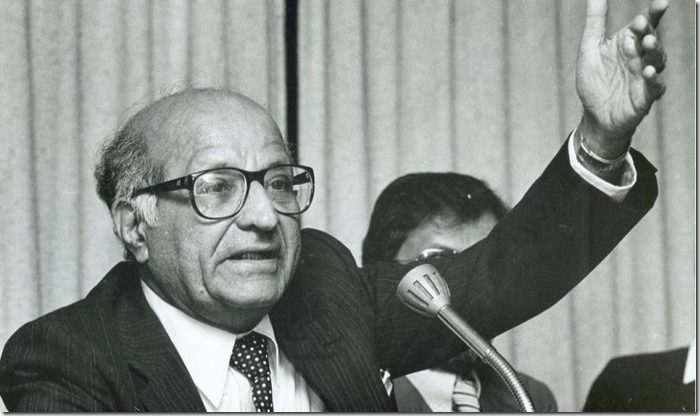Due to sensational events that seem to happen almost daily these days, we tend to forget legendary personalities. One of them was Nani Palkhivala, whose 100th birthday was on Thursday, January 16.
Palkhivala was born in Bombay (now Mumbai), came from a Parsi working class family and became a household name in India. His father was in the palkhi (Litter) business and hence the family name Palkhivala.
Palkhivala’s schooling took place in the city’s high school tutorial. As a brilliant student he attended St. Xavier’s College after enrolling and did his master’s degree in English literature. Palkhivala applied for a position as a lecturer at Bombay University, but a Parsi lady was appointed for this position. He then enrolled at Government Law College. If Palkhivala had been a lecturer, Bombay University would have received a brilliant lecturer, but the world of law would have been a loser.
Advertisement
Palkhivala was lucky enough to join the chambers of the great Jamshedji Kanga in Bombay. He had no godparents in his job. Its ascent was meteoric. Within a few years, he was briefed on all important matters of the Bombay High Court. Palkhivala also taught at Government Law College in Bombay. He made himself popular among the students with his clear presentation of the subject, the law of evidence, with a dash of humor and wit. His class consisted only of students who had no bunk. In fact, they all wanted his talk to continue beyond the scheduled time.
Palkhivala was an unmatched lawyer. Clarity of thought, precision and elegance of expression, passionate pleading for what he stood for, excellent farm work and exceptional ability to think on his feet made him an irresistible force. He was also briefed on virtually all matters of constitutional importance to the Supreme Court (SC). His forensic achievements in the areas of bank nationalization and secret money were remarkable.
However, the high point of his fame was his advocacy and statements in the Keshavanand Bharti case, in which he convinced the SC that the power to amend the constitution was not unlimited and could not be exercised to damage its basic structure. That was Palkhivala’s great contribution to constitutional jurisprudence. I was lucky and privileged to be his junior in this case and have vivid memories of the preparations that went into the case. Palkhivala was at the best forensic level in his submissions to the bank to rethink Keshavan and Bharti’s decision. One of the judges on the bank said: Supreme Court rarely reached and never exceeded. “
His actions were not limited to courts in our country. He represented India in three cases in international forums. The first was before the United Nations special court in Geneva, which ruled on Pakistan’s right to enclaves in Kutch. Another was before the International Civil Aviation Organization in Montreal and later on an appeal before the World Court in The Hague.
Palkhivala was known for his famous annual household speeches, which began in 1958 in a small hall in an old hotel in Bombay. He spoke for almost an hour without notes and without facts and figures from his mind and kept his audience in suspense. There were said to be two budget speeches, one by the Minister of Finance and the other by Nani Palkhivala, and Nani’s speech was undoubtedly the most popular and popular.
Palikhivala was not drawn to the rituals and ceremonies of religion. He believed in and practiced the essence of the Zoroastrian religion in which he was born:Humata, Hukhata, Huvarashta”- good words, good thoughts, good deeds. Sri Aurobindo was his favorite writer and thinker, whose writings attracted him very much. The fearlessness with which he spoke regardless of the party in power made him the voice of conscience of the nation.
The most outstanding quality of Palkhivala was his helpfulness and his humility and modesty. Fame and fortune have not increased the hat size of the legendary Palkhivala. There was no sign of arrogance and imagination. He was tender to the shy, gentle to the distant, and merciful to the absurd.
Literature was another connection between Palkhivala and me besides law. We enjoyed Shakespeare’s sonnets and the Victorian poets. Chesterton, Lucas and AG Gardiner were our favorite essayists. Palkhivala was almost depressed by the catastrophic deterioration in moral and spiritual values in our public life. His desire was to create a movement to revive values and to maintain and revive idealism among young people.
Palkhivala was struggling for a while in the last lap. It was painful to see that such an eloquent and articulated person was unable to speak or recognize people, except occasionally for a moment. He died on December 11, 2002. Born out of the sun, he traveled towards the sun for a while, leaving the living air with his honor.
Soli Sorabjee is a former Attorney General of India
The views expressed are personal


